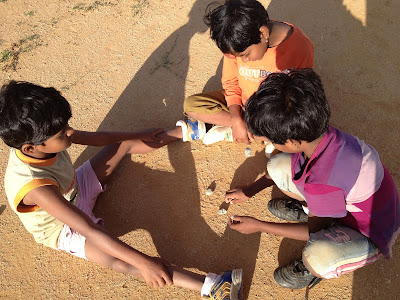Shanti Bhavan came into existence by Dr. Abraham George in 1997 as one of the projects by The George Foundation. His vision was to create a school that allowed children of the lowest castes (Dalits) to receive an excellent education in order to transform their communities. The children come from rural areas of Tamil Nadu, Andhra Pradesh, and Karnataka. In his book, India Untouched, Dr. George details the complications of poverty in India and the long journey to creating a school in a rural area.
The finished product was a residential school that houses approximately 200 children, preschool through 12th grade and also full college tuition funded. The They all stay on campus in dorm-like buildings, but as many as 30 beds are spread across a large room. The oldest children from the school are now in their 3rd year of college and 3 of them recently received offers from Goldman Sachs India! The education received here has really provided these kids with an opportunity to succeed.
Each day, the children participate in a very structured schedule of activities. Their day begins at 6:30am and formally ends at 8:00pm for preschool-5th grades and 9:30pm for the older kids. Each day there is an assembly that provides a time for announcements, top news stories from around the world, and an explanation of the weekly virtue.
Every morning, there is the school's equivalent to P.E. called Physical Training. The children basically have free play on the field and enjoy games like cricket or tag.


Here are some girls that I taught salsa dancing one morning.


Here are some girls that I taught salsa dancing one morning.
The kids' resourcefulness is very evident in some of the other games they play. Like this game they created by using rocks!
During the afternoon once the class periods have finished, the younger children maintain the school by doing "community service" work.
I taught 4th, 8th, and 10th graders various English classes like reading, grammar, persuasive writing, literature, and spelling. I taught around 24 classes each week. I really experienced being a full time teacher. I was expected to plan lessons for each period, create tests, and manage homework assignments. It definitely gave me a greater respect for my own teachers from elementary, middle, and high schools.
Here are some pictures of the 4th graders.
Here are some of the 8th grade boys.
Here are some of the 8th grade girls.
Here are the 10th graders. The photos are kind of fuzzy because it was raining and they insisted on taking pictures outside.
I also taught some of the older girls some basic Latin dance moves from salsa, merengue, and bachata. After the first class, I had mentioned that there were some American style dances and the girls got really excited. So, I began by teaching them the Cupid Shuffle and from there I also taught the Electric Slide, the Wobble, 2-step and Walk It Out. They all had a great time! :)
Despite the overall success of the school, I noticed a few challenges during my time with the kids. First of all, there is no formal psychological support for some of the developing issues among the older children. A few girls shared with me that they had struggled with thoughts of suicide and running away from the school. They explained that they often keep these feelings to themselves. They also expressed the difficulty in keeping a journal because of the shared space. Nothing is private. One girl kept a journal, but it was then read by almost everyone in her dorm. The barrier in providing this type of support is having sufficient monetary funding. As it is, the school has changed the quality of food they serve and maintain many books from at least 10 years ago. I would also say that almost half of the school is supported by the work of volunteers that come in to teach or to manage various administrative duties.
Secondly, the way in which the children are chosen creates a sense of entitlement in some of the children. The school requires that only one child per family is admitted to the school in order to help as many families as possible. Although I understand the desire to spread the wealth in terms of education to impact many families, it creates a sense of inequality among many families. A few children voiced that they are treated special in their family based on the fact that they are attending an English medium school and everything is paid. This attitude seems to transfer in the classroom behavior with some children as I found it somewhat difficult to handle those who often gave certain demands and expected teachers to provide certain favors. I can only imagine how their siblings must feel to not be the "chosen one."
Overall, the school is a great example of how education can change a group of children and also have a ripple effect on their families, communities, and future generations. It also provided a cost effective model that allowed for volunteers to supplement teaching and offer these children a unique educational experience with exposure to different cultures. Although I was not able to witness the change, the children really impressed me with their intelligences and incredible warmth and caring towards me. I felt extremely welcomed from day 1 and have stored unforgettable memories of my time with the kids.



















No comments:
Post a Comment
Note: only a member of this blog may post a comment.